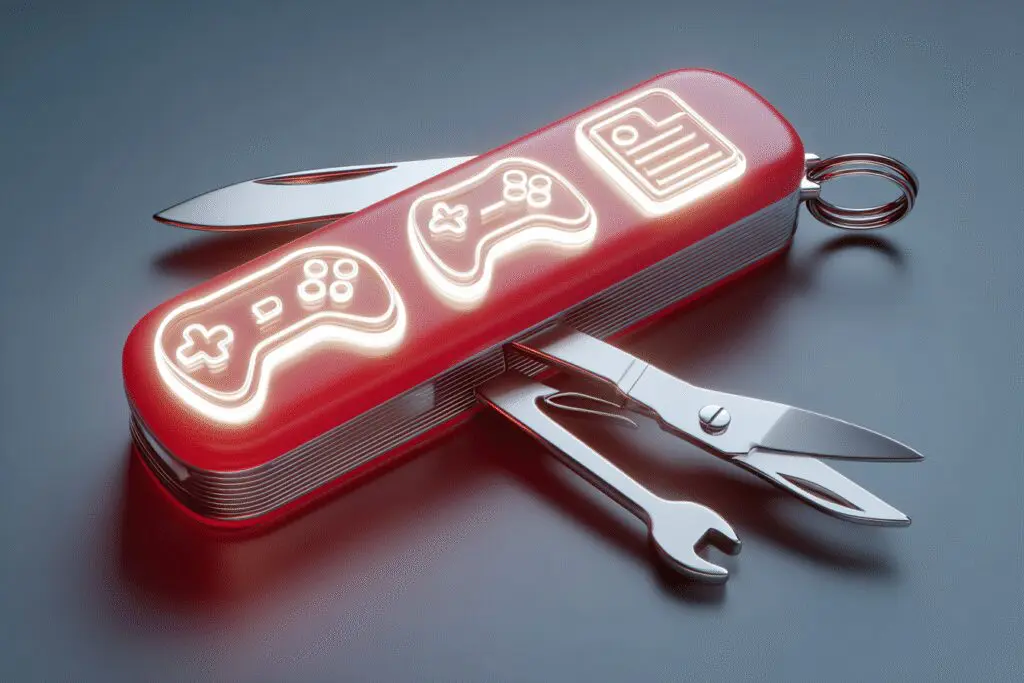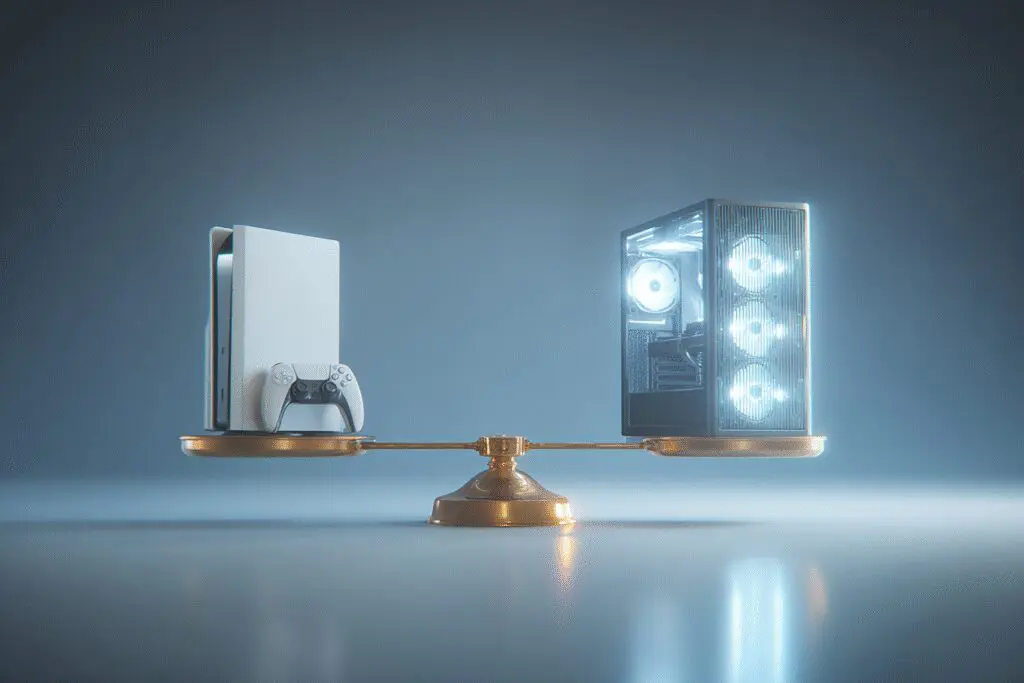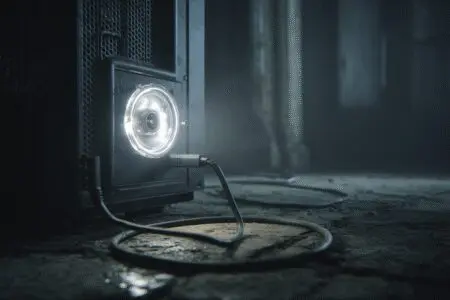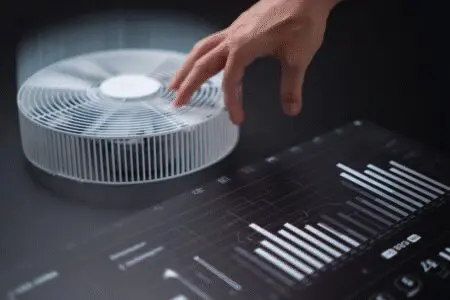The flickering glow of a screen, a controller or mouse in hand—this is the modern campfire for many of us. For decades, however, a fundamental question has divided the tribe: console or PC? It’s a debate that has fueled countless forum threads and friendly arguments. You’ve probably found yourself wondering, especially with the steep price of new hardware, is a gaming PC worth it in today’s world? The simple answer is, it depends. But that’s not very helpful, is it?
This isn’t about declaring a winner. Instead, this is a deep dive into the real-world costs, tangible benefits, and everyday experiences of both platforms. I’ve been on both sides of this fence, starting with consoles as a kid and eventually building my own gaming rigs as an adult. Consequently, I’ve felt both the simple joy of a console and the deep satisfaction of a perfectly tweaked PC. Let’s break down everything you need to know to decide where your money and time are best spent.
More in PC Maintenance Category
How Much Power Does a Gaming PC Use
What’s the Real Upfront Cost of PC vs. Console Gaming?
Money is often the first and most significant hurdle. On the surface, consoles seem like the clear winner in affordability, but the long-term financial picture can be much more complex.
Breaking Down the Price of a Modern Console
When you walk into a store, buying a console is straightforward. A PlayStation 5 or an Xbox Series X will typically set you back around $500. If you opt for a digital-only version or the less powerful Xbox Series S, that price can drop even lower. It’s a simple, one-time purchase that gets you everything you need to start playing right out of the box.
However, the initial purchase isn’t the whole story. You’ll likely want an extra controller, which can cost another $70. Moreover, to play most games online, you need a subscription service like PlayStation Plus or Xbox Game Pass Core. While services like Game Pass Ultimate offer incredible value by providing a huge library of games, it’s still a recurring monthly cost that adds up over the console’s lifespan.
The major benefit here is predictability. You know exactly what you’re getting for your money, and there are no surprise hardware compatibility issues to worry about.
The Many Tiers of Building or Buying a Gaming PC
Now, let’s look at the PC. The cost of a gaming PC is not a single number but a vast spectrum. You can build a capable entry-level machine that outperforms a console for around $700 to $800, but the sky is truly the limit.
- The Budget Build (~$700 – $900): This is the console-killer territory. A PC in this range can comfortably play most modern games at 1080p resolution with solid frame rates. My first build was in this bracket, and I was blown away by how much better games looked and felt compared to the console I was used to. It requires careful part selection, but it’s very achievable.
- The Mid-Range Powerhouse (~$1,200 – $1,800): This is the sweet spot for many PC gamers. Here, you get a machine that can handle gaming at 1440p resolution with high frame rates and graphical settings. It offers a significant, noticeable leap in visual quality and performance over any console.
- The High-End Enthusiast Rig (~$2,000+): This is where you go for broke. These PCs are designed for 4K gaming, ultra-high refresh rates, and maxing out every graphical setting without breaking a sweat. It’s an enthusiast’s dream, but it comes with a price tag to match.
Of course, this doesn’t include peripherals. A good gaming monitor can cost anywhere from $150 to over $1,000. Additionally, a quality mouse and keyboard will add another $100 or more. While these costs add up, they are also investments in a superior and more comfortable user experience.
Is a Gaming PC Worth It for Sheer Performance and Graphics?
If your goal is the absolute pinnacle of gaming performance and visual fidelity, the answer to this question is an unequivocal yes. This is where the PC truly distances itself from the competition.
Can Consoles Compete with High-End PC Graphics?
Let’s be clear: modern consoles are incredibly powerful machines. They deliver stunning 4K visuals and smooth 60 frames-per-second (fps) gameplay in many titles. For most people, sitting on a couch in front of a big-screen TV, the experience is fantastic and more than enough.
However, to achieve this, consoles often rely on clever technical tricks like dynamic resolution scaling and checkerboard rendering. They also offer very limited graphical options. You can’t, for example, prioritize an even higher frame rate by lowering shadow quality, or push the texture detail beyond the developer’s preset. You get the experience the developer intended, with no room for adjustment.
The Unmatched Power and Customization of PC Gaming
A gaming PC, on the other hand, gives you complete control. You can fine-tune dozens of graphical settings to match your hardware’s capabilities and your personal preferences.
Do you play competitive shooters like Valorant or Apex Legends? A PC allows you to lower graphical settings to achieve frame rates well over 200 fps, giving you a tangible competitive advantage with smoother aiming and faster on-screen updates. Do you prefer breathtaking single-player adventures? You can push every setting to ultra, enable advanced features like ray tracing for realistic lighting, and enjoy a level of visual detail that consoles simply cannot match.
Furthermore, PC gaming opens up a world of monitor technology. You can use an ultrawide monitor for a more immersive, cinematic field of view, or a high-refresh-rate monitor (144Hz or higher) for buttery-smooth motion that makes everything feel incredibly responsive. Once you experience high-refresh-rate gaming, it’s honestly hard to go back to a standard 60Hz display.
Let’s Talk About the Games: Selection, Cost, and Exclusives
Hardware is only half the equation; the games are what truly matter. Here, the choice between console and PC becomes a question of what kind of library you want access to.
The Curated World of Console Exclusives
Consoles have historically held a major trump card: exclusive titles. Blockbuster series like The Last of Us and God of War on PlayStation, Halo on Xbox, and The Legend of Zelda on Nintendo are system-sellers. These are masterfully crafted, critically acclaimed games that, for a long time, you could only play on their respective platforms.
This is changing somewhat, with many PlayStation and Xbox exclusives eventually making their way to PC. However, there’s often a waiting period of a year or more. If you want to play the biggest blockbuster games the day they are released, and your favorite franchises are tied to a specific console, this is a powerful reason to stick with that ecosystem.
The Endless Ocean of PC Games
The PC, in contrast, offers an unparalleled ocean of choice. It is an open platform, meaning anyone can develop and publish a game. This results in a library that is deeper and more varied than any console could ever hope to match.
- Vast Digital Storefronts: Through platforms like Steam, the Epic Games Store, and GOG, you have access to hundreds of thousands of games, from AAA blockbusters to tiny indie gems.
- Unbeatable Sales: PC gamers live for the legendary Steam sales. You can often buy incredible games that are only a year or two old for less than the price of a cup of coffee. This significantly lowers the long-term cost of gaming.
- Free Games: The Epic Games Store, for instance, gives away free games every single week. Over a few years, you can build a massive library without spending a dime.
- Backward Compatibility: A modern gaming PC can play games released 20 years ago just as easily as it can play a title that launched yesterday. This provides access to the entire history of PC gaming in a way consoles can’t match.
The Game-Changing World of PC Modding
This is perhaps the PC’s most unique and powerful advantage. “Modding” is the community-driven act of modifying a game’s files to add new content, change gameplay mechanics, or improve graphics.
For a game like Skyrim, there are mods that add entirely new continents to explore, overhaul the graphics to look better than modern releases, and introduce thousands of new items and characters. For strategy games, mods can add new factions and units. For simulation games, they can add new vehicles and locations. I remember spending a whole weekend installing over 100 mods into Fallout 4 to create a completely personalized, unique survival experience. It was almost a game in itself. This ability for a community to endlessly iterate on and improve a game gives PC titles a lifespan that can stretch for decades.
Which Platform is Easier to Live With Day-to-Day?
Your gaming platform is something you’ll interact with regularly, so the user experience is a crucial factor to consider. This is where the core philosophies of the two platforms really diverge.
The “It Just Works” Appeal of a Gaming Console
A console is the definition of a plug-and-play device. You take it out of the box, plug it into your TV, and after a brief setup and some game installations, you are ready to go. The user interface is simple, designed to be navigated easily with a controller from your couch.
There are no drivers to update for your graphics card, no settings to tweak in a configuration file, and you never have to worry if your hardware is good enough to run a new game. If a game is released on the PlayStation 5, you know your PlayStation 5 will run it. This simplicity and reliability are massive selling points, especially for those who just want to unwind and play games without any hassle.
The PC Gamer’s Learning Curve: Are You a Tinkerer?
Owning a gaming PC is a more hands-on experience. It requires a certain level of engagement that might not appeal to everyone. You’ll need to periodically update your graphics card drivers to ensure optimal performance in new games. Sometimes, a new game might have a bug or a performance issue on your specific hardware configuration, sending you to a forum to find a fix.
I’ve had moments of pure frustration where I spent an entire evening trying to troubleshoot a crashing game instead of actually playing it. However, there’s a flip side to this. There is an immense sense of satisfaction that comes from solving a problem and getting your system to run perfectly. Building the PC yourself, understanding how each component works together, and upgrading it over time creates a connection to your machine that you just don’t get with a console. It becomes your rig, tailored specifically to you.
What Can You Do Beyond Gaming? The Versatility Factor
This is an area where the debate becomes almost one-sided. A gaming PC isn’t just a gaming machine; it’s a high-performance computer that can do anything a regular computer can, but better and faster.
A console is a specialized piece of entertainment hardware. It plays games, streams media from apps like Netflix and YouTube, and can play Blu-ray discs. It does these things very well, but its functionality is largely fixed.
A gaming PC, on the other hand, is a multi-purpose tool that can enrich your life in countless ways.
- Productivity and Schoolwork: All the power that makes games run smoothly also makes everyday tasks feel lightning-fast. Writing papers, building spreadsheets, and browsing the web are effortless.
- Creative Hobbies: A powerful graphics card is essential for more than just gaming. It accelerates demanding tasks like video editing, 3D modeling, graphic design, and music production.
- Content Creation: If you’ve ever thought about streaming on Twitch or creating gaming content for YouTube, a PC is practically a necessity. It has the power to run a game and encode a high-quality video stream simultaneously.
- Endless Customization: From the operating system to the software you install, you have complete control over your computing environment.
This versatility is a massive value proposition. When you invest in a gaming PC, you’re also investing in a powerful workstation and creative studio. For anyone interested in the technical side of how these components empower such varied tasks, university resources like this PC building guide from the University of Illinois Library can offer a great foundational understanding.
The Final Verdict: How Do You Choose What’s Right for You?
After all this, the path forward should be clearer. There is no universally “better” option, only the option that is better for you. It comes down to your priorities, your budget, and the kind of experience you’re looking for.
Choose a Console If…
You should lean towards a PlayStation 5 or Xbox if you value simplicity and convenience above all else. A console is the right choice if you want a predictable, affordable, and hassle-free entry point into high-quality gaming. It’s perfect for living room entertainment and for playing the biggest exclusive titles the moment they launch. If you just want to sit down and play with zero fuss, a console will never let you down.
Is a Gaming PC Worth It? Yes, If…
You should seriously consider a gaming PC if you are the kind of person who wants the ultimate experience and isn’t afraid of a little tinkering to achieve it. A PC is for the player who craves the highest frame rates, the sharpest graphics, and total control over their games. It’s the platform for those who want access to the largest and most affordable library of titles, and for those who see value in a machine that is as powerful for work and creativity as it is for play.
Ultimately, both paths lead to the same destination: incredible worlds, compelling stories, and unforgettable experiences. Whether you’re navigating the cosmos from a couch with a controller or commanding armies from a desk with a mouse, you’re part of a vibrant global community. The choice isn’t about which platform is superior, but about which one best fits your life. Choose the one that will bring you the most joy, because in the end, that’s what gaming is all about.
Frequently Asked Questions

What are the long-term cost benefits of owning a gaming PC compared to a console?
A gaming PC can save money in the long run because it has no ongoing online fees, often has cheaper games due to frequent sales, and can be upgraded over time rather than replaced. Additionally, it serves as a versatile tool for work and other hobbies, adding to its overall value.
Is a gaming PC better for competitive gaming and fast-paced games?
Yes, gaming PCs typically have higher frame rates and lower latency, providing smoother visuals and quicker response times. This makes them ideal for competitive gaming, where precision and reaction speed are crucial.
Can a gaming PC provide better graphics and performance than a console?
Yes, a gaming PC can deliver better graphics and smoother gameplay due to more powerful graphics cards, higher resolutions like true 4K, ultra settings, and advanced features like ray tracing, as well as higher frame rates for more responsive gaming.
How does the ease of use compare between gaming consoles and gaming PCs?
Consoles are much easier to use because they are plug-and-play with standardized hardware, meaning every console is the same and requires no technical setup. PCs require managing different parts, drivers, and settings, which can be more complex but offers more customization.
Why is the initial cost of a gaming PC often higher than that of a console?
A gaming PC typically costs more upfront because it involves selecting individual parts that can be more expensive than a pre-built console. However, this higher initial investment allows for later upgrades and customization, providing long-term value.





